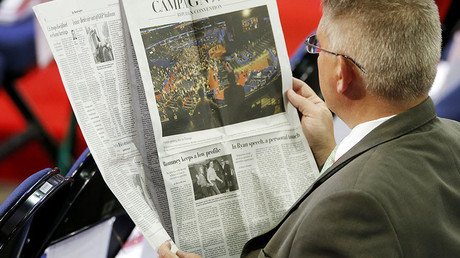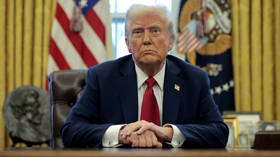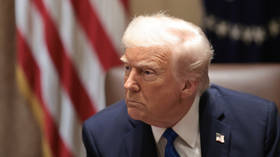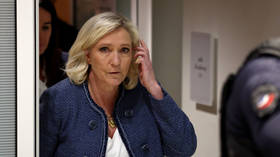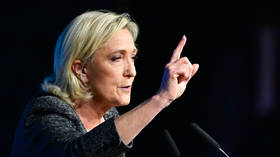Mainstream media’s Russian ‘fake news’ narrative kills real debate – Spectator deputy editor
Western mainstream media’s ‘McCarthian’ witch hunt for Russia’s influence on the media shuns objectivity in favor of hysteria – a dangerous reductionism that dumbs down the debate on information warfare, argues Spectator deputy editor Freddy Gray.
There has recently been a proliferation of the ‘fake news’ narratives in the Western media, which shows no signs of dying down. The gist of these stories is essentially that false news stories have been planted by a foreign actor in order to influence the political affairs of another, and the consequent accusations asserting that the 2016 US presidential election was swayed in favor of Donald Trump by such alleged manipulation of the news by Russia has thrust the issue into the spotlight.
READ MORE: Between imaginary threats and hysteria: How Russia dominates Western headlines
A Washington Post article recently accused 200 US news sites of being “routine peddlers” of Russian propaganda. New Yorker magazine subsequently released an article entitled ‘The Propaganda about Russian Propaganda,’ which slammed the report as a total mess.
Gray examines what this means for journalistic standards and integrity.
RT: This story came out last week but keeps getting pushed and pushed by the mainstream media. Why do you think they are so keen on it at the moment?
Freddy Gray: I think it is obvious to anyone with a brain that the Democrats are trying to blame Russian propaganda for the fact that they dramatically misunderstood the American electorate. The problem is that it creates a sort of atmosphere of hysteria when people see Russian influence everywhere.
And, in this atmosphere of hysteria, a lot of things get missed. For example, the disinformation that Russia does spread gets missed because we’re so busy being hysterical about Russian hacking, and so on, and things for which there is not much evidence, that we miss the fact that there is a Russian propaganda operation just like there are other propaganda operations, and we are in danger of being the boy who cried “Wolf!” In danger of being the boy who cried “Propaganda!”
RT: What is your view on the actual list itself? The fact that there are 200 organizations which have now been labeled, essentially, as “Fake news – do not read.” Many people would say – “This is all freedom of speech, whether you agree with it or not. Why shouldn’t there be sides that disagree with, perhaps, a mainstream narrative?”
FG: I think the whole fake news has a strong Orwellian quality. I think what the media needs to do is to remember they are there to pass a message, not protect a message. And that, actually, by telling people that what they are listening to is fake news, that they’re indulging in fake news themselves. Generally, what we are trying to do at the Spectator is inform the reader. We don’t try and tell him that everything he is reading is lies. We trust that the reader is clever enough to perceive bias in him or herself.
RT: Just on that point, we know that you did run on your front page with a picture of Vladimir Putin holding up an iPad with RT on it – you were jumping on the bandwagon yourselves.
FG: I do think that RT is a propaganda arm of Vladimir Putin. I don’t think there’s any denying that really by any rational means. But I think, if you’ve read the article, what it was saying is that Western media shouldn’t be so hysterical about it. It should be realistic about what Russia is doing or something that RT does and not try to pretend that it’s got a more sinister influence than it does.
‘Shameful & disgusting’: Rolling Stone slams WaPo ‘fake news’ story https://t.co/ux4uSThOTVpic.twitter.com/9CpmX089U5
— RT America (@RT_America) November 30, 2016
RT: Is it a danger, though, when you label something as propaganda? Because you do stigmatize it, don’t you? There are many valid points that are made by alternative media, too, that shouldn’t go unheard.
FG: Sure. Propaganda is itself a provocative word, and that’s not a bad point. I mean a state-owned broadcaster is propaganda. You could probably say the same about BBC, but I think RT is slightly different. So, I think Western media need to be realistic about what RT is, and not see it as a mortal enemy – but also accept that you are going to have your biases, just like, perhaps, we have our biases too.
RT: Have you noticed that people are latching onto this fake news and also equating it with Russian propaganda, because they seem to be mixing the two quite readily. Why is that?
FG: Yes, I think nobody really has an idea of what is true anymore, which is more to do with a sort of collapse of Western morality, perhaps, than anything else. So, therefore, people are desperate to spy conspiracy, they are desperate to be suspicious of the media. And they generally don’t trust what they are reading and what they are listening to. And that is because all round the place they’re being pushed a message rather than told what is going on. I think that is a crisis for the media.
RT: I suppose one argument would be: Many people are turning towards alternative media because they’re fed up of, perhaps, what they’ve been told by the mainstream media, that they’ve found out not to be true.
FG: Well, I quite agree with that. The exciting thing for journalists like me is that, finally, Trump’s election has large downsides, but also some upsides, in that the media now have really got to sharpen up its act and stop just peddling the usual rubbish that they peddle. And the battle for ideas generally is hotting up, so the people are interested in what the media has to say, and they’re skeptical. And therefore, the duty of journalism has been strengthened, I think.
RT: Generally speaking about this fake news list, the criteria that was used seem to be quite loose too. This story sort of got legs – when it first came out, many people were critical of it. The New Yorker said it was a complete mess, the criteria that it used. Is there a danger that people will be influenced now by what they read and, perhaps, might decide, just because of this article, that they shouldn’t go near these 200 or so names that are on this list?
FG: Well, there’s a problem in, I think it was a Washington Post article originally, there’s a problem in that the financial model of journalism, as it was, has collapsed, and therefore a lot of reporters will just take a steer from someone who is just feeding them a story, because they’re desperately rushed, desperately overworked, they’re probably spending most of their time on Twitter, and therefore they’re not really doing their job as a journalist. And I think that’s finally bringing a change – people are getting much more skeptical about what they’re reading in the so-called mainstream media, and I think, perhaps, that’s a good thing.
RT: Sure, and what’s your take on the whole issue of Russia influencing elections? An overreaction?
FG: I think, definitely, there’s hysteria in America at the moment. I think there’s no doubt about that. I do think Russia tried to influence the election. I don’t actually think it, probably… probably the Kremlin wanted Trump to win eventually, but, certainly, they were against the Clintons, and understandably so. But countries always try and spread a message that’s favorable to them – that’s natural.
The statements, views and opinions expressed in this column are solely those of the author and do not necessarily represent those of RT.

